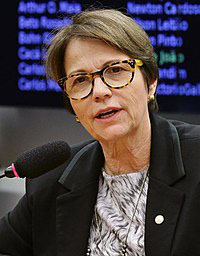BRASILIA, (Reuters) – Brazil should open indigenous land to commercial farming, Agriculture Minister Tereza Cristina Dias said yesterday, while also seeking to soften many of President Jair Bolsonaro’s controversial stances on native people and the environment.
Farmers form a key base of support for right-wing firebrand Bolsonaro who since taking office Jan. 1 has placed pro-agribusiness policies at the center of his agenda. Activists warn his government’s positions would strip away protections for the environment, the Amazon rainforest and indigenous peoples.
Reservation land covering roughly 12 percent of Brazil’s territory is currently off limits for commercial farming.
“They could plant there … and maybe have income for their community,” Dias told reporters. “They cannot do this today. That needs to be changed in Congress.”
Reservations should still be required to preserve a minimum percentage of native vegetation, as all farmers currently are, she said.
Bolsonaro has given control over indigenous land designations to the Agriculture Ministry, after arguing on the campaign trail that no new indigenous reservations should be created. But Dias struck a more moderate tone, saying Bolsonaro did not favor new reservations in areas that have long been settled by farmers.
“Small farmers that have been there 50 years and have deeds issued by the state or federal government, if you kick them out, there aren’t conditions there for indigenous people to hunt and fish and have their lives,” she said in a press briefing.
“When the president says he doesn’t want more demarcations, he’s talking about this type of contested areas.”
But the Amazon deserves completely different treatment, and tribes with little contact with the outside world should be protected, she said, a position that is shared by Brazil’s new rights minister who will be responsible for indigenous affairs.
Bolsonaro has suggested Brazil may exit the Paris Agreement on climate change and appointed a foreign minister who calls global warming a leftist fabrication. But Dias said she is fine with staying in the accord, as the country is on track to meet its climate change goals.
As for a campaign promise to end the “industry” of environmental fines, Dias told Reuters prior to the briefing that Brazil must end “indiscriminate” fines levied by multiple agencies without working with the farmers to resolve misunderstandings.






